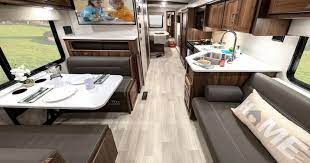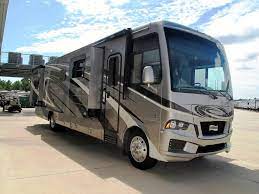The Ultimate Guide to Recreational Vehicles
Recreational vehicles, commonly known as RVs, have become a popular choice for travel enthusiasts seeking adventure on the open road. These versatile vehicles offer a unique way to explore the great outdoors while enjoying the comforts of home. From compact campervans to luxurious motorhomes, there is an RV to suit every traveler’s needs and preferences.
Types of RVs
RVs come in various types and sizes, each offering different features and amenities. Some of the most common types of recreational vehicles include:
- Class A Motorhomes: These are large, bus-like vehicles that offer spacious interiors and amenities such as full kitchens, bathrooms, and living areas.
- Class B Campervans: Compact and easy to maneuver, campervans are ideal for solo travelers or couples looking for a more minimalist camping experience.
- Class C Motorhomes: These mid-sized RVs provide a good balance of space and maneuverability, making them popular among families and small groups.
- Travel Trailers: Towable trailers that come in various sizes and configurations, offering flexibility for different towing vehicles.
- Fifth-Wheel Trailers: Similar to travel trailers but designed to be towed by pickup trucks with a specialized hitch that extends over the truck bed.
Benefits of RV Travel
Traveling in an RV offers numerous benefits for adventurers looking to explore new destinations:
- Flexibility: With an RV, you have the freedom to change your itinerary on a whim and explore off-the-beaten-path locations.
- Comfort: RVs provide all the comforts of home, including sleeping quarters, kitchen facilities, and bathroom amenities.
- Cost-Effective: Compared to traditional hotel stays and air travel, RV travel can be a more budget-friendly option for long-term trips.
- Contact with Nature: Camping in an RV allows you to immerse yourself in nature while still enjoying modern conveniences.
Tips for RV Travelers
If you’re considering embarking on an RV adventure, here are some tips to make your journey more enjoyable:
- Pack strategically and efficiently to make the most of limited storage space.
- Familiarize yourself with your RV’s systems and maintenance requirements before hitting the road.
- Plan your route ahead of time but remain open to spontaneous detours along the way.
- Show respect for nature by practicing Leave No Trace principles during your outdoor adventures.
ol>
7 Advantages of RV Travel: From Spontaneous Journeys to Comforts of Home on the Move
- Flexibility to change travel plans on the go
- Convenience of having all essentials within reach while traveling
- Cost-effective accommodation option for extended trips
- Opportunity to explore remote and off-the-beaten-path destinations
- Comfortable and familiar living space on the road
- Ability to enjoy outdoor activities without sacrificing modern amenities
- Sense of community and camaraderie among fellow RV travelers
Seven Downsides of Owning a Recreational Vehicle: From Parking Troubles to Depreciation Woes
- 1. Limited Parking Options
- 2. High Fuel Consumption
- 3. Maintenance Costs
- 4. Limited Accessibility
- 5. Initial Investment
- 6. Storage Challenges
- 7. Depreciation
Flexibility to change travel plans on the go
One of the key advantages of traveling in a recreational vehicle is the unparalleled flexibility it offers to change travel plans on the go. Unlike traditional forms of travel that often require fixed reservations and itineraries, RV travelers have the freedom to adapt their journey in real-time. Whether discovering a hidden gem along the way or deciding to extend a stay in a picturesque location, RV enthusiasts can embrace spontaneity and explore off-the-beaten-path destinations without constraints. This flexibility adds an element of excitement and adventure to the travel experience, making each trip in an RV truly unique and memorable.
Convenience of having all essentials within reach while traveling
One of the key advantages of recreational vehicles is the convenience of having all essentials within reach while traveling. With an RV, travelers can enjoy the comfort of having their living space, kitchen facilities, bathroom amenities, and sleeping quarters all in one vehicle. This eliminates the need to constantly search for accommodation or dining options along the way, providing a seamless and stress-free travel experience. Whether embarking on a weekend getaway or a cross-country road trip, having everything you need conveniently located in your RV enhances the overall enjoyment and ease of travel.
Cost-effective accommodation option for extended trips
Recreational vehicles offer a cost-effective accommodation option for extended trips, making them a popular choice among budget-conscious travelers. By eliminating the need for expensive hotel stays and dining out every meal, RV travelers can significantly reduce their overall trip expenses. With the convenience of having their own kitchen facilities onboard, travelers can prepare their meals, saving money on dining costs while still enjoying delicious home-cooked meals on the road. Additionally, many campsites and RV parks offer affordable overnight rates, further contributing to the affordability of RV travel for those looking to embark on extended journeys without breaking the bank.
Opportunity to explore remote and off-the-beaten-path destinations
Recreational vehicles offer adventurers the incredible opportunity to explore remote and off-the-beaten-path destinations that may be inaccessible by traditional means of transportation. With the freedom to travel at their own pace and the ability to camp in secluded areas, RV travelers can immerse themselves in untouched natural beauty, discover hidden gems, and truly connect with the wilderness in a way that few other modes of travel allow. This sense of exploration and discovery adds a thrilling element to RV journeys, making each trip a unique and unforgettable adventure.
Comfortable and familiar living space on the road
One of the key advantages of recreational vehicles is the ability to have a comfortable and familiar living space while on the road. Whether you’re embarking on a weekend getaway or an extended road trip, having your own cozy environment with all the amenities of home can make a significant difference in your overall travel experience. With features like a well-equipped kitchen, a comfortable bed, and a private bathroom, RVs provide a sense of familiarity and comfort that allows travelers to relax and unwind after a day of exploration. This unique aspect of RV travel ensures that you can enjoy the journey as much as the destination, creating lasting memories along the way.
Ability to enjoy outdoor activities without sacrificing modern amenities
Recreational vehicles offer the unique advantage of allowing travelers to enjoy outdoor activities without sacrificing modern amenities. Whether you’re hiking in a national park, fishing by a serene lake, or simply relaxing under the stars, an RV provides all the comforts of home while immersing you in nature. With features like fully-equipped kitchens, cozy sleeping quarters, and bathroom facilities, you can experience the great outdoors without compromising on convenience and comfort. This seamless blend of outdoor adventure and modern conveniences makes RV travel an ideal choice for those seeking a balance between exploration and relaxation.
Sense of community and camaraderie among fellow RV travelers
One significant pro of recreational vehicles is the sense of community and camaraderie that develops among fellow RV travelers. Sharing a common love for adventure and exploration, RV enthusiasts often form connections with like-minded individuals on the road. Whether it’s swapping travel stories around a campfire, helping each other navigate unfamiliar terrain, or simply waving hello as they pass by on the highway, RV travelers often find a sense of belonging and friendship within this unique community. The shared experiences and mutual appreciation for the RV lifestyle create bonds that can turn strangers into lifelong friends.
1. Limited Parking Options
One significant drawback of recreational vehicles is the limited parking options they present. The size of RVs can make it challenging to find suitable parking spots, especially in urban areas or crowded campgrounds. Maneuvering these large vehicles into tight spaces can be a daunting task, leading to frustration for RV owners seeking convenient parking solutions. This limitation often requires careful planning and consideration when traveling with an RV to ensure a smooth and stress-free parking experience.
2. High Fuel Consumption
One notable drawback of recreational vehicles is their high fuel consumption. RVs are not renowned for their fuel efficiency, leading to significant fuel expenses, particularly during extended journeys. This aspect can add a considerable financial burden to travelers, impacting the overall cost of the trip and requiring careful budgeting to manage fuel costs effectively.
3. Maintenance Costs
Maintenance Costs: One significant drawback of owning a recreational vehicle is the ongoing maintenance expenses. Ensuring that an RV remains in optimal condition necessitates regular upkeep and repairs, which can accumulate into substantial costs over time. From engine tune-ups to plumbing fixes, the financial investment needed to keep an RV roadworthy can sometimes catch owners off guard and impact their overall travel budget.
4. Limited Accessibility
Limited Accessibility is a significant con of recreational vehicles, as some remote or off-grid locations may be inaccessible to large RVs. This limitation can restrict the camping options for travelers who seek to explore secluded or less-traveled areas that require navigating through narrow roads or rough terrain. In such cases, travelers with larger RVs may need to compromise on their desired destinations or opt for alternative accommodations, affecting the flexibility and spontaneity of their travel plans.
5. Initial Investment
One notable drawback of recreational vehicles is the initial investment required for purchase. Buying an RV can entail a substantial financial commitment, which may deter budget-conscious travelers from considering this mode of travel. The upfront cost of acquiring an RV, along with potential ongoing expenses for maintenance, insurance, and storage, can make ownership less accessible to those seeking a more economical travel option.
6. Storage Challenges
Storage challenges can present a significant con for recreational vehicle owners. The task of finding sufficient storage space for an RV when it is not in use can be a logistical headache for many. Limited availability of secure and convenient storage facilities can lead to added stress and expenses for owners who need to store their RVs during off-season periods or when not in use. This issue of storage challenges underscores the importance of careful planning and consideration when investing in an RV.
7. Depreciation
Depreciation is a significant con of recreational vehicles, as they lose value over time just like any other vehicle. This can result in financial losses for owners, especially if they choose to sell their RV in the future. The depreciation of RVs is a consideration that prospective buyers should keep in mind when evaluating the long-term costs and benefits of owning such a vehicle.
Tags: adventurebenefits of rv travel campervans class a motorhomes class b campervans class c motorhomes comfort comforts of home contact with nature cost-effective fifth-wheel trailers flexibility great outdoors motorhomes open road recreational vehicles rvs tips for rv travelers travel enthusiasts travel trailers types of rvsCategory: Uncategorized




